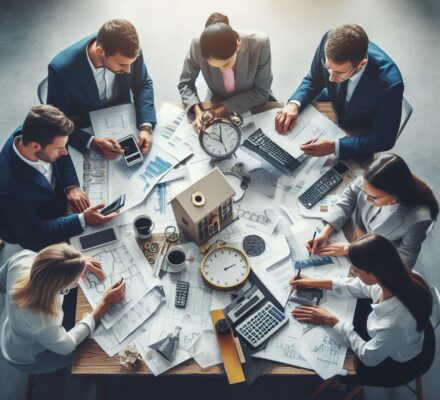Are you ready to dive into the world of property valuation for 1031 exchange?
Brace yourself for a rollercoaster ride as we uncover 8 common mistakes that could cost you dearly.
Get ready to navigate through the treacherous waters of inaccurate appraisals, hidden costs, and the importance of professional advice.
Don’t let these pitfalls sink your investment ship – join us as we equip you with the knowledge to make informed decisions and avoid potential disasters.
Key Takeaways
- Relying on an inaccurate appraisal can lead to overpaying for a replacement property.
- Considering market trends is crucial for a successful 1031 exchange.
- Property depreciation must be taken into account in property valuation for a 1031 exchange.
- Hidden costs and expenses can significantly impact the overall financial plan.
Inaccurate Property Appraisal
One common mistake in a 1031 exchange is relying on an inaccurate property appraisal. When it comes to valuing your property, accuracy is crucial. An incorrect appraisal can have significant consequences, potentially leading to financial loss and legal complications.
Firstly, an inaccurate appraisal can result in overpaying for a replacement property. If the appraiser overvalues the property, you may end up purchasing it for a higher price than it’s actually worth. This can impact the overall success of your 1031 exchange, as the goal is to defer capital gains tax by reinvesting the full proceeds into a like-kind property.
Additionally, an inaccurate appraisal can also lead to underpaying for a replacement property. If the appraiser undervalues the property, you may miss out on potential appreciation and rental income. This can limit your investment returns and hinder your ability to generate passive income.
To avoid relying on an inaccurate appraisal, it’s essential to work with a qualified and experienced appraiser who has a thorough understanding of the local market conditions. They should possess the necessary expertise to accurately assess the value of the property and provide you with a reliable appraisal.
Ignoring Market Trends and Conditions
You shouldn’t ignore market trends and conditions when engaging in a 1031 exchange for property valuation. To ensure a successful exchange, it’s crucial to consider the current state of the market and how it may impact the value and potential growth of your investment. Ignoring market trends and conditions can lead to costly mistakes and missed opportunities.
Here are four reasons why you should pay attention to market trends and conditions:
- Accurate valuation: Understanding market trends allows you to accurately assess the value of the properties you’re considering for exchange. By analyzing recent sales data, rental rates, and market forecasts, you can make informed decisions and avoid overpaying for a property.
- Identifying opportunities: Monitoring market trends helps you identify areas or property types that are experiencing growth or have the potential for future appreciation. By focusing on these opportunities, you can maximize your return on investment and potentially secure properties with higher long-term value.
- Mitigating risks: Market conditions can impact the stability and profitability of your investment. By staying informed, you can mitigate risks associated with economic downturns, changes in interest rates, or shifts in local market dynamics.
- Market demand: Understanding market trends allows you to align your investment strategy with current demand. By investing in properties that are in high demand, you increase the likelihood of finding suitable replacement properties and attracting potential tenants or buyers.
Failing to Consider Property Depreciation
Consider the impact of property depreciation to avoid a common mistake in 1031 exchanges. Failing to take property depreciation into account can have significant financial consequences. Depreciation is the decrease in the value of a property over time due to wear and tear, aging, and obsolescence. It is an important factor to consider when valuing a property for a 1031 exchange because it affects the cost basis of the property and can impact the amount of taxes owed.
To illustrate the impact of property depreciation, let’s take a look at a hypothetical example:
| Year | Purchase Price | Depreciation | Remaining Value |
|---|---|---|---|
| 1 | $500,000 | $20,000 | $480,000 |
| 2 | $480,000 | $25,000 | $455,000 |
| 3 | $455,000 | $30,000 | $425,000 |
As you can see from the table above, property depreciation reduces the value of the property over time. This can result in a lower cost basis for the property and potentially lower taxes owed when selling the property in the future.
By failing to consider property depreciation, you may overvalue the property and potentially overpay for it in a 1031 exchange. It is crucial to consult with a qualified appraiser or tax professional who can accurately assess the depreciation of the property and provide guidance on its impact on your 1031 exchange.
Overlooking Hidden Costs and Expenses
Be aware of the hidden costs and expenses that can be easily overlooked during a 1031 exchange. While the primary focus of a 1031 exchange is to defer capital gains tax by reinvesting the proceeds into a like-kind property, it’s essential to consider the additional costs that may arise.
Here are four common hidden costs and expenses to keep in mind:
- Closing Costs: When selling your relinquished property and acquiring a replacement property, there are various closing costs involved, such as title insurance, escrow fees, and transfer taxes. These costs can add up and impact your overall financial plan.
- Financing Costs: If you require financing for the replacement property, there will be associated costs, including loan origination fees, appraisal fees, and underwriting fees. These expenses can significantly impact your cash flow and should be factored into your decision-making process.
- Property Inspections: It’s crucial to thoroughly inspect the replacement property before completing the exchange. The cost of hiring professional inspectors to assess the property’s condition and identify any potential issues should be considered.
- Ongoing Expenses: Once you acquire the replacement property, you’ll incur ongoing expenses such as property taxes, insurance, maintenance, and management fees. These expenses can impact your cash flow and overall return on investment.
Relying Solely on Tax Assessment Value
One common mistake to avoid during a 1031 exchange is relying solely on the tax assessment value when valuing the replacement property. While tax assessments can provide a general indication of a property’s value, they aren’t always accurate or up-to-date. Tax assessments are typically conducted infrequently, often once every few years, and may not reflect the current market conditions or the specific characteristics of the property.
Property values can fluctuate significantly over time, especially in dynamic real estate markets. Relying solely on the tax assessment value can result in overpaying for a replacement property or undervaluing it, which can impact the success of your 1031 exchange. To ensure an accurate valuation, it’s crucial to conduct a comprehensive property appraisal or hire a professional appraiser who specializes in 1031 exchanges.
Additionally, factors such as location, condition, market demand, and recent comparable sales should also be taken into consideration when valuing a replacement property. By relying solely on the tax assessment value, you may miss out on potential opportunities or fail to recognize the true value of the property.
To avoid this common mistake, it’s important to gather all relevant information and conduct a thorough analysis of the replacement property’s value. By doing so, you can make informed decisions and maximize the benefits of your 1031 exchange.
Now, let’s move on to the next common mistake: not conducting thorough due diligence.
Not Conducting Thorough Due Diligence
To ensure a successful 1031 exchange, it’s crucial that you thoroughly conduct due diligence when evaluating potential replacement properties. Skipping this step can lead to costly mistakes and missed opportunities.
Here are four common errors to avoid when it comes to due diligence:
- Failure to review property documents: It’s essential to obtain and carefully review all relevant documents, such as leases, financial statements, and property condition reports. These documents provide crucial information about the property’s current condition and potential income.
- Neglecting property inspections: A thorough inspection by a qualified professional is necessary to identify any hidden issues or potential problems that may affect the property’s value or future rental income. Skipping this step can result in unexpected expenses or disputes with tenants.
- Ignoring market research: Understanding the local market conditions and trends is vital for making an informed decision. Analyze factors such as vacancy rates, rental demand, and comparable property sales to assess the property’s potential for appreciation and income growth.
- Overlooking legal and regulatory compliance: Failing to investigate zoning restrictions, environmental regulations, and other legal requirements can lead to costly violations or limitations on property use. Consult with legal and tax professionals to ensure compliance with all applicable laws.
Underestimating Property Maintenance and Repairs
When it comes to property maintenance and repairs, it’s crucial not to underestimate the hidden costs that may arise. Failure to uncover these expenses during due diligence can lead to financial setbacks down the line.
Additionally, neglecting to address deferred maintenance can significantly impact the property’s value and attractiveness to potential buyers. It’s essential to budget for future repairs and allocate sufficient funds to ensure the property remains in good condition.
Hidden Repair Costs
Don’t overlook the importance of accurately assessing property maintenance and repair costs during a 1031 exchange. Hidden repair costs can significantly impact the profitability of your investment.
Here are four common mistakes to avoid when estimating property maintenance and repair expenses:
- Underestimating the age and condition of the property: Older properties may require more frequent repairs and maintenance, which can add up quickly.
- Ignoring the hidden issues: Superficial inspections may not uncover underlying problems such as plumbing or electrical issues, which can be costly to fix.
- Failing to account for regular maintenance: Every property requires ongoing maintenance, such as painting, landscaping, and HVAC service. Neglecting these routine tasks can lead to bigger and more expensive repairs down the line.
- Overlooking code compliance: Changes in building codes and regulations may require updates to the property, which can be an unexpected expense.
Deferred Maintenance Impact
Accurately assessing property maintenance and repair costs is crucial in a 1031 exchange. Underestimating these expenses can have a significant impact on the profitability of your investment. One common mistake investors make is failing to account for deferred maintenance when valuing a property for a 1031 exchange. Deferred maintenance refers to the necessary repairs and maintenance that have been postponed or neglected over time.
It’s important to thoroughly inspect the property and consider any outstanding repairs that may need to be addressed. Underestimating these costs can lead to unexpected expenses down the line, affecting your cash flow and potential return on investment. To avoid this mistake, it’s crucial to conduct a comprehensive evaluation of the property’s maintenance and repair needs and factor in these costs when determining its value for a 1031 exchange.
Budgeting for Future Repairs
To avoid underestimating property maintenance and repairs, make sure to budget for future repairs in your 1031 exchange. Here are four reasons why budgeting for future repairs is crucial:
- Preventive Maintenance: By budgeting for future repairs, you can proactively address any maintenance issues before they turn into costly problems.
- Increased Property Value: Regular repairs and maintenance can help maintain and increase the value of your property, ensuring a higher return on investment.
- Tenant Satisfaction: Well-maintained properties attract and retain high-quality tenants, leading to lower vacancy rates and increased rental income.
- Compliance with Regulations: Budgeting for repairs allows you to meet any regulatory requirements and avoid fines or penalties.
Overlooking the Importance of Professional Advice
You shouldn’t underestimate the significance of seeking professional advice when it comes to property valuation for a 1031 exchange.
The process of valuing a property for a 1031 exchange can be complex and requires a deep understanding of market trends, property values, and tax regulations. By overlooking the importance of professional advice, you run the risk of making costly mistakes that may impact the success of your exchange.
A professional valuer can provide you with an accurate and unbiased assessment of the value of your property. They have the knowledge and expertise to consider factors such as market conditions, comparable sales, and property improvements that may affect the value of your property. Their objective analysis can help you determine the fair market value of your property, which is crucial for a successful 1031 exchange.
Furthermore, professional advice can help you navigate the intricate tax regulations associated with a 1031 exchange. They can guide you through the process, ensuring that you comply with all the requirements and deadlines set by the IRS. Failing to seek professional advice can result in unintentional tax consequences and penalties that could have been avoided.
Frequently Asked Questions
What Are Some Common Hidden Costs and Expenses That Investors Often Overlook When Conducting Property Valuation for a 1031 Exchange?
When conducting property valuation for a 1031 exchange, investors often overlook common hidden costs and expenses. It’s important to be aware of these potential pitfalls in order to make informed decisions and avoid costly mistakes.
How Can Market Trends and Conditions Impact the Valuation of a Property in a 1031 Exchange?
Market trends and conditions can significantly impact the valuation of a property in a 1031 exchange. It’s essential to analyze current market data, such as supply and demand, interest rates, and economic indicators, to make an accurate assessment.
What Are the Potential Consequences of Relying Solely on Tax Assessment Value When Determining the Value of a Property for a 1031 Exchange?
Relying solely on tax assessment value when determining a property’s value for a 1031 exchange can have serious consequences. It may lead to inaccurate valuation and potential financial loss.
What Are Some Important Factors to Consider When Conducting Thorough Due Diligence for Property Valuation in a 1031 Exchange?
When conducting thorough due diligence for property valuation in a 1031 exchange, it’s important to consider factors like market conditions, comparable sales, property condition, and location. Don’t overlook these crucial elements.
How Can Underestimating Property Maintenance and Repair Costs Impact the Success of a 1031 Exchange?
Underestimating property maintenance and repair costs can jeopardize your 1031 exchange. It can lead to unexpected expenses, decrease your potential profit, and hinder the success of your exchange. Be diligent in assessing these costs.




